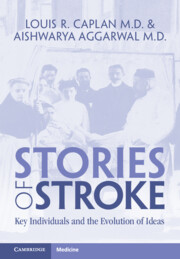Book contents
- Stories of Stroke
- Stories of Stroke
- Copyright page
- Contents
- Contributors
- Why This Book Needed to Be Written
- Preface
- Part I Early Recognition
- Chapter One Hippocrates and Early Greek Medical Practice
- Chapter Two Early Greco-Roman Contributions
- Chapter Three Islamic and Middle Eastern Contributions
- Part II Basic Knowledge, Sixteenth to Early Twentieth Centuries
- Part III Modern Era, Mid-Twentieth Century to the Present
- Part IV Stroke Literature, Organizations, and Patients
- Index
- References
Chapter Three - Islamic and Middle Eastern Contributions
from Part I - Early Recognition
Published online by Cambridge University Press: 13 December 2022
- Stories of Stroke
- Stories of Stroke
- Copyright page
- Contents
- Contributors
- Why This Book Needed to Be Written
- Preface
- Part I Early Recognition
- Chapter One Hippocrates and Early Greek Medical Practice
- Chapter Two Early Greco-Roman Contributions
- Chapter Three Islamic and Middle Eastern Contributions
- Part II Basic Knowledge, Sixteenth to Early Twentieth Centuries
- Part III Modern Era, Mid-Twentieth Century to the Present
- Part IV Stroke Literature, Organizations, and Patients
- Index
- References
Summary
Quran (the holy book), prophetic traditions (sunnah) and Prophet Muhammad Peace Be Upon Him (PBUH) sayings (hadith) are the cornerstone of Islamic knowledge. Jurists and scholars later expanded on these foundations to build Islamic literature, not only about matters of prayers and submission, but also on day-to-day life affairs. Countless traditions and hadith deal with ailments and healing. Books that became a science of their own known as Tibbul-Nabbi; the Medicine of Prophet (PBUH), are based on these writings.
- Type
- Chapter
- Information
- Stories of StrokeKey Individuals and the Evolution of Ideas, pp. 10 - 18Publisher: Cambridge University PressPrint publication year: 2022



